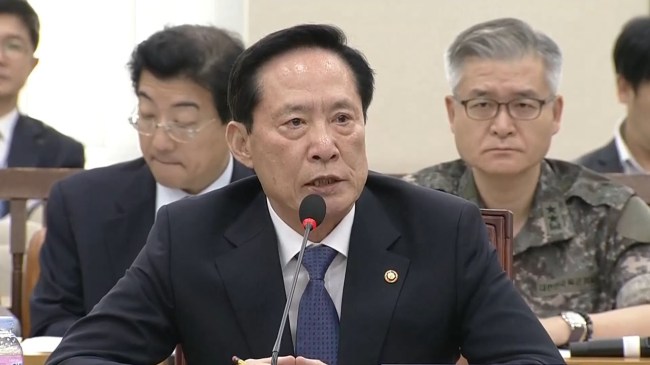Defense chiefs of S. Korea, US discuss outcome of Pyongyang summit in phone talks
By YonhapPublished : Sept. 21, 2018 - 11:17
The defense chiefs of South Korea and the United States on Friday held telephone talks to share the outcome of this week's inter-Korean summit in Pyongyang, Seoul's defense ministry said.
During the talks, Defense Minister Song Young-moo explained to his US counterpart James Mattis the results of the summit, including the bilateral military agreement on halting all hostile acts, and Seoul's efforts for denuclearization and a lasting peace on the peninsula.

"As the two countries' defense chiefs expressed expectations that the inter-Korean summit would help foster the conditions for amicable denuclearization dialogue between the North and the US, they agreed to back up efforts in the military sector to ensure that meaningful and verifiable steps toward the complete denuclearization of the peninsula will materialize," the ministry said in a press release.
The ministry also said that Mattis reaffirmed Washington's "iron-clad" commitment to the defense of South Korea that involves a whole range of the US military capabilities, while the defense chiefs agreed to keep a strong combined defense posture and close security coordination.
The ministry, in addition, noted that shortly after his return from Pyongyang on Thursday, Song met US Forces Korea Commander Gen. Vincent Brooks to brief him on the results of the third summit between President Moon Jae-in and North Korean leader Kim Jong-un.
During the two rounds of the summit on Tuesday and Wednesday, Kim reiterated his commitment to nuclear disarmament and offered to dismantle his country's main long-range missile engine test site and launch pad in the presence of international inspectors and close the main Yongbyon nuclear complex should the US take "corresponding measures."
The two leaders also agreed on a series of conventional arms control measures, such as setting up air, maritime and ground buffer zones in which the two sides will not conduct military exercises, including live-fire drills. (Yonhap)


![[Exclusive] Korean military set to ban iPhones over 'security' concerns](http://res.heraldm.com/phpwas/restmb_idxmake.php?idx=644&simg=/content/image/2024/04/23/20240423050599_0.jpg&u=20240423183955)

![[Graphic News] 77% of young Koreans still financially dependent](http://res.heraldm.com/phpwas/restmb_idxmake.php?idx=644&simg=/content/image/2024/04/22/20240422050762_0.gif&u=)



![[Pressure points] Leggings in public: Fashion statement or social faux pas?](http://res.heraldm.com/phpwas/restmb_idxmake.php?idx=644&simg=/content/image/2024/04/23/20240423050669_0.jpg&u=)










